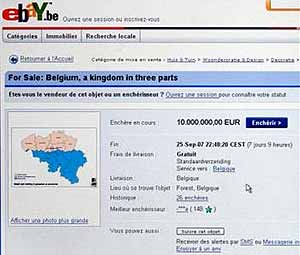October 12, 2007 (the date of publication in Russian)
Alexander Sobko
EUROPE MINUS BELGIUM
EU: parade of sovereignties continues
 How to organize a new government without risk of ruining the statehood? This problem is encountered today not only by Ukraine, the unsuccessful candidate for EU, but also by the very country where the European Union's headquarters is based.
How to organize a new government without risk of ruining the statehood? This problem is encountered today not only by Ukraine, the unsuccessful candidate for EU, but also by the very country where the European Union's headquarters is based.
During already four months, the political class of Belgium remains unable to set up a new government, which, in accordance with the national constitution, is supposed to be selected from the coalition of parties which have won the race for the parliaments of Flanders and Wallonia. This protracted stalemate is already not amusing but annoying for the public. This disgust was reflected in the move of Gerrit Six, a former journalist today making his bread as a family tutor, who pitched the state of Belgium at the eBay auction for a price of 10 million euros.
Today's Belgium is a federation of two lands, established on an ethnic principle. Citizens of Flanders speak Flemish, while Walloons speaks French. However, the two lands differ also in the level of economic development, in which Flanders far exceeds Wallonia. Not surprisingly, it was Flanders which raised the issue of a higher status of autonomy, in order to get rid of the necessity to maintain the insolvent "smaller sister".
In September, after a lengthy period of political uncertainty, a number of MPS from the Flemish Interest Party tabled a bill on a public referendum of Flanders' independence. Though the Parliament of Flanders was reluctant to support this initiative, the issue is likely to be raised repeatedly and gain more support.
The political background is quite favorable for Belgium's split-up. Last week, over 350 radical proponents of Flanders' independence from the ranks of Voorpost Party marched across the streets of the Walloon-dominated town of Rhode Saint Genese, chanting "Belgium Die", spitting on the federal flag and burning it down. The action attracted much attention from foreigners, and the Foreign Ministry of Belgium issued a special instruction for diplomats: "In case you are inquired whether the country is divided into Flemish and Francophone parts, you should say no".
Ethnic nationalism had been developing in Flanders for decades. Ironically, the country's disintegration became real exactly in the period when the Eurobureaucrats got focused on integrationist initiatives, describing the potential recognition of Kosovo’s independence as an exceptional case.
The complicacy of the conflict is evident from the fact that in late September, King Albert II had to interrupt his vacation and convene the Council of the Crown. The previous meeting of this body was held was far back as in 1960, focused on disintegration of Belgium's colonial empire in Congo. Today, the mother country faces a similar challenge.
According to latest polls, over one half of Flanders' citizens anticipate declaration of independence. The slogan, chanted by Flemish nationalists at their recent march – "Walloon rats, pack your bags!" speaks for itself.
Centrifugal processes develop today in many countries of the European Union. As RPMonitor already reported, similar slogans are now addressed to the English by the Scotch. In Italy, the Lega NordPartyspeaks for independence of the country’s northernmost provinces, referring to the historical Lega Lombarda. In Spain, the issue of independence of the Land of Basques is still on the table.
Thus, Belgium's disintegration may open a Pandora box of new secessionist movements. In the new millennium, Western Europe may return to the times of "feudal fragmentation", as the period of Russian history preceding the Mongol-Tatar invasion is referred to in school textbooks.
Number of shows: 1160
 ENG
ENG 

 ENG
ENG 
